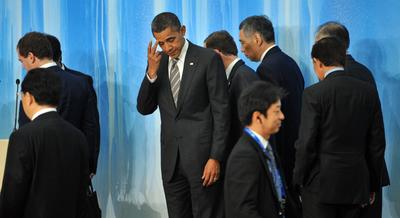And what can China’s neighbours do, with or without US help, to shift the answer toward the cooperative end of the spectrum?
Relevant to these two questions is a third: will China work with other countries multilaterally, or will it insist bilateral diplomacy and unilateral action?
The answer will depend on many conditions and contingencies. Obviously events and trends in the external environment will influence China’s behaviour. So will conditions inside the country, including the dynamics of domestic politics. China’s outlook on the world may reflect the relative influence of hardliners in the military and soft-liners among civilian specialists on foreign affairs, or of the conservative rhetoric of President Hu Jintao and the progressive language of Prime Minister Wen Jiabao. Nationalist insistence on Chinese prerogatives and aversion to multilateralist compromise could be an intentional effort by Chinese leaders to stimulate anti-foreign patriotism in order to distract domestic attention from local grievances. Ascribing any one motive to Chinese foreign policy ignores the complexities. Intentions and conditions are more likely to operate in combination. The outcomes of foreign-policy disputes involving China are accordingly difficult to predict.
The relevance of domestic politics for foreign policy is not limited to China.
The Obama administration has reached out to ASEAN and other multilateral networks in Asia. Obama and his team hope that such frameworks can help to accommodate China constructively within a stable regional order. How the US should deal with China was not a major issue during the campaign that culminated in Republican control of the House of Representatives. One can nevertheless imagine a situation in which the Obama administration’s multilateralist gamble in Asia falls prey to some combination of factors including Republican aversion to the compromises that successful roundtable diplomacy requires. Nor is time on Obama’s side. If his foreign travel schedule in months to come does not yield results that can be sold to the American public, Republicans will declare the multilateralist experiment a failed product of naivete.
In this context, President Obama’s trip will be judged in no small part on two grounds. Did it further the American and Asian interest in encouraging China to play a cooperative future role in world affairs? And did it validate the Obama administration’s decision to work with Asians, including China, in multilateral settings?
Answering these questions will require introspection and clarification. What is a ‘constructive’ role? What does it mean to be ‘cooperative’? Who gets to define these terms? The US? China? The G20? Everyone?
In 2005, then-deputy secretary of state Robert Zoellick famously urged Beijing to become a ‘responsible’ stakeholder in the international system. But precisely how is such a stakeholder expected to behave? The US has not yet tackled the issue of whether rights should match responsibilities, and whether China has the right to change the international system by making it less reliant on American policy and less responsive to American preferences.
Recently Australian analyst, Hugh White, expressed concern that the US may not be willing to share power with China. Depending on events, this could become an appropriate future concern. Obama’s administration and his present trip, however, point toward a different judgment: that the US is willing to sit down with China and others around a table and jointly seek solutions. The durability of that American willingness will depend, however, on the efficacy of these multilateral settings.
Relative to its historic peaks, US power has declined. Relative to what it might someday become, Chinese power falls short. In such mutable conditions, Asian hosts and multilateral arrangements deserve American attention. In this supposedly ‘Asian’ century, the wishes and actions of the leaders that Obama meets on his trip could more than marginally influence just how Chinese, or how American, the terms of the two countries’ mutual adaptation will be.
Donald K Emmerson heads the Southeast Asia Forum at Stanford University. His latest book is an edited volume, ’Hard Choices: Security, Democracy, and Regionalism in Southeast Asia’ (2008).
An earlier version of this essay appeared here in Asia Times Online.


Dear Professor Emmerson,
This is an excellent overview of the issue.
Much depends on whether (unlike the US at most times) China can resist the temptation to go it alone and/or pick off others one by one.
I would welcome your comments on Stewart Patrick’s article in the Nov/Dev 2010 issue of Foreign Affairs.
Best wishes
Andrew Elek
Dear Andrew (please call me Don), Your comment re China is well taken. Beijing’s hub-and-spokes view of the South China Sea is not encouraging in this regard. Then again, the economic future of ASEAN Plus Three could benefit from a more cooperative role that Beijing’s seems to envision for itself in that preferred regional-policy field. (China’s behavior in the “other” field, the EAS, next year, esp. if Obama does manage to attend, will be interesting to watch.)
As for the Patrick piece, I thought it was first-rate. My only (minor) cavils concern
(a) his possibly overoptimistic hope that the US can successfully propose “concrete benchmarks for eligibility” that would actually govern the accession of new candidates for permanent seats on the Security Council (including willingness to reinforce the use of military force under the Charter’s Chapter 7);
(b) his recommendation that the G20’s scope be expanded to encompass security issues including peacekeeping and nonproliferation, insofar as such a step would further dilute a body that showed in Seoul how hard it is for it to gain traction on global finance let alone noneconomic matters; and
(c) the tension between (i) the inconsistencies that are necessary for “multipolarity without multilateralism” to work (or for a pragmatically selective and constantly rebalancing Concert of Europe Redux to keep the world reasonably stable) and (ii) his closing insistence that the US must “become a more consistent exemplar of multilateral cooperation.”
But these are quibbles. It’s a fine piece of work in my view. What did you think?